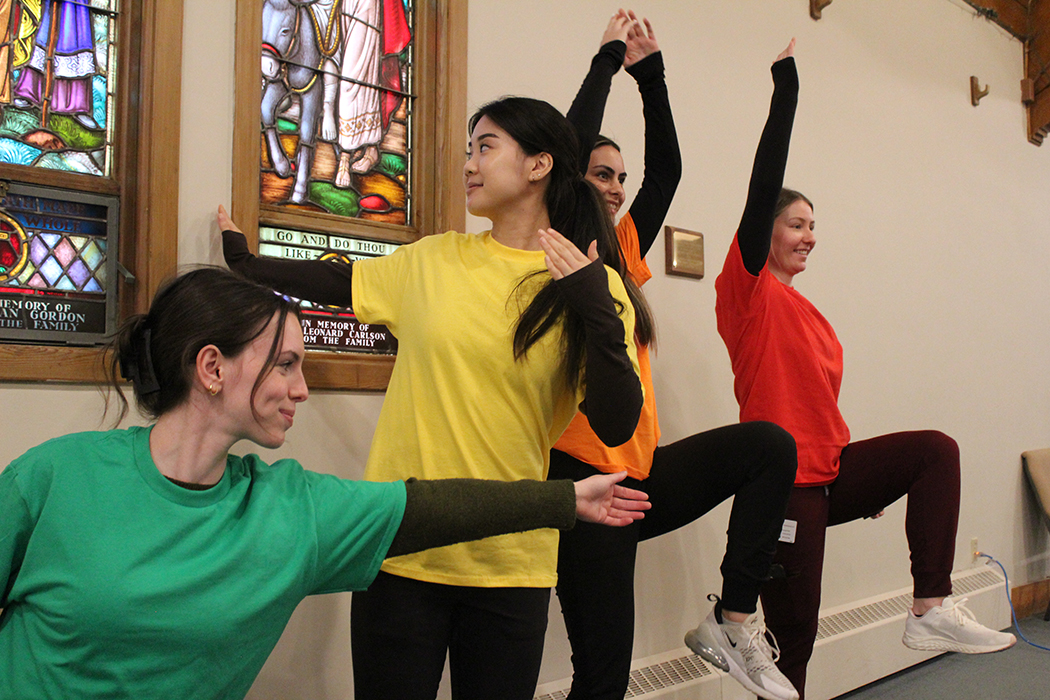
Physical therapy students (L to R) Andrea Loraas, Cora Tsang, Kiersten Hilland and Brooklyn Meiklejohn lead a group exercise, each performing movements based on the participants' colour-coded needs.
Students lead wellness workshop for Parkinson’s community
An interprofessional group of Rady Faculty of Health Sciences students led a workshop recently for more than 40 people living with Parkinson’s disease and their care partners.
The event was organized by Sarah Conci, physical therapy instructor and coordinator of the UM Student-Led Interprofessional Neuro Clinic (SLIC), housed at Riverview Health Centre, along with UTurn Parkinson’s, a Winnipeg-based organization focused on wellness and exercise.
Nineteen students from the College of Rehabilitation Sciences, College of Nursing and College of Pharmacy participated, as part of fieldwork placements. It was held May 23 at Churchill Park United Church, where UTurn Parkinson’s regularly meets with members.
A similar workshop, focused solely on physical therapy, was held last year. Conci said the idea of incorporating an interprofessional focus came as she was screening clients for the clinic, which usually offers one-on-one goal-oriented and task-based physiotherapy treatment sessions.
“I was talking to a lot of people with Parkinson’s disease who had questions and goals related to exercise and wellness, but their needs didn’t really fit for our typical programming,” she said.
Second-year physical therapy (PT) student Kiersten Hilland has worked with several clients with Parkinson’s in her placements and was excited to bring the group together.
“I’ve noticed when we do workshops that a large part of it is the community people form. They sit together and share their experiences, and now they have people from different health professions here to answer any questions,” she said.
The PT students led participants through movement exercises that were geared to various levels of difficulty, based on UTurn Parkinson’s colour-coded system for exercise. Students wore t-shirts in four different colours – green, yellow, orange and red – and participants could follow the student wearing the colour that best suited their abilities.
Second-year respiratory therapy (RT) student Graciel Espiritu said Parkinson’s can lead to severe breathing difficulties. Two RT students were on hand to discuss how they can work with those living with Parkinson’s.
“RTs work closely with clients by focusing on respiratory function as a therapeutic target to enhance quality of life,” Espiritu said.
Sophie Harms was one of four nursing students who took part. They discussed the symptoms and progression of the disease based on changes in the brain.
“With nursing, education is a big part of patient advocacy that we do, so this is a great opportunity to engage with members of the community and provide some education,” Harms said.
First-year occupational therapy (OT) student Jess Friesen said she was looking forward to working on an interprofessional project on this scale.
“For OT students, we do a lot of interprofessional work in our program. We talk a lot about where OT fits within these interprofessional roles, so SLIC allows us the opportunity to put what we have learned into practice,” Friesen said.
Three fourth-year pharmacy students gave a presentation on the most common medications used for Parkinson’s and information on interactions with over-the-counter medications.
“It was really eye opening to see how many questions there were for us at the end,” said Daria Rempel. “It was a really good reminder of how impactful Parkinson’s medication regimens can be on patients’ lives.”
UTurn Parkinson’s was founded eight years ago by Tim Hague, who was diagnosed with the disease in 2011. He said the event was a great way to get word out about the organization to young people entering health careers.
“We know that Parkinson’s has no cure, that it is progressive, and the only thing that we’ve found that will make things better for us – other than our medication – is exercise,” he said. “But the students bring the whole analytical side to it, the research – plus a lot of energy and knowledge from their individual specialties.”






